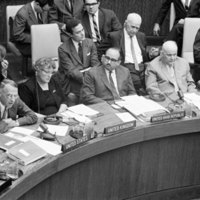Outer Space Treaty
One of the original copies of the Antarctic Treaty. The twelve nations that signed the Antarctic Treaty in December 1959 were Argentina, Australia, Belgium, Chile, France, Japan, New Zealand, Norway, South Africa, the USSR, the United Kingdom, and the United States of America. Courtesy of the National Archives and Records Administration.
In December 1959, the Antarctic Treaty established the Antarctic as an international area that would "be used exclusively for peaceful purposes [...] with the interests of science and the progress of all mankind." President Dwight D. Eisenhower initiated the negotiations that brought about the treaty. He believed that, like the Antarctic, outer space should also be a peaceful territory. In a speech to the United Nations General Assembly on September 22, 1960, Eisenhower called for the nations of the world to extend the principles of the Antarctic Treaty to outer space. However, his Presidential term ended shortly thereafter and John F. Kennedy was elected.
Kennedy's administration continued to push for Eisenhower's ideal of peace in outer space and supported an October 1963 UN resolution that called upon nations to refrain from introducing weapons of mass destruction into space. After Kennedy's assassination on November 22, 1963, his successor, Lyndon B. Johnson, took up the cause. Under Johnson, Eisenhower's vision of a peace treaty for space was finally put into action on October 10, 1967. The Outer Space Treaty exists to this day and forms the basis for international space law. The treaty states, among other things, that no nation can lay claim to space or any celestial bodies and that any exploration of space should be done for the benefit of every country.





